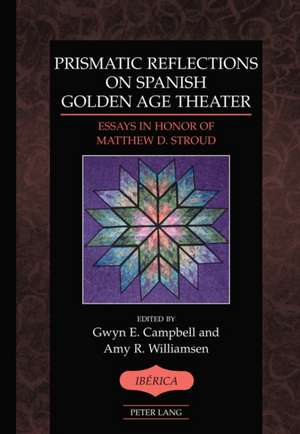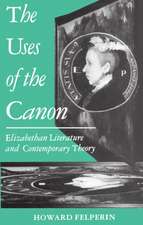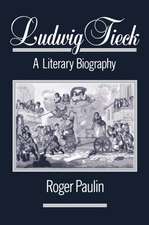Prismatic Reflections on Spanish Golden Age Theater: Iberica, cartea 44
Editat de Gwyn E. Campbell, Amy R. Williamsenen Limba Engleză Hardback – 27 oct 2015
Preț: 706.90 lei
Preț vechi: 918.06 lei
-23% Nou
Puncte Express: 1060
Preț estimativ în valută:
135.27€ • 141.59$ • 112.58£
135.27€ • 141.59$ • 112.58£
Carte tipărită la comandă
Livrare economică 01-15 aprilie
Preluare comenzi: 021 569.72.76
Specificații
ISBN-13: 9781433130083
ISBN-10: 1433130084
Pagini: 373
Dimensiuni: 150 x 225 x 28 mm
Greutate: 0.66 kg
Editura: Peter Lang Gmbh, Internationaler Verlag Der W
Seria Iberica
ISBN-10: 1433130084
Pagini: 373
Dimensiuni: 150 x 225 x 28 mm
Greutate: 0.66 kg
Editura: Peter Lang Gmbh, Internationaler Verlag Der W
Seria Iberica
Notă biografică
Gwyn E. Campbell (PhD, Princeton) is Professor of Spanish at Washington and Lee University. Her co-edited volumes include: Zayas and Her Sisters: An Anthology of Novelas by 17th-century Spanish Women Writers; Zayas and Her Sisters, II: Essays on Novelas by 17th-century Spanish Women Writers; and a critical edition of Leonor de Meneses's El desdeñado más firme. Amy R. Williamsen (PhD, University of Southern California) is Professor of Spanish at the University of North Carolina-Greensboro. In addition to her book Co(s)mic Chaos: Exploring Los trabajos de Persiles y Sigismunda, her co-edited volumes include: Critical Reflections: Essays on Spanish Golden Age Literature in Honor of James A. Parr; Engendering the Early Modern Stage: Women Playwrights in the Spanish Empire; Ingeniosa Invención: Studies in Honor of Professor Geoffrey Stagg; and María de Zayas: The Dynamics of Discourse.
Cuprins
Contents: David J. Hildner: Wife-Murder Deflected: How Stage Husbands' Prudence and Ingenuity Lead to Differing Outcomes - Susan L. Fischer: «Nada me digas»: Silencing and Silence in Comedia Domestic Relationships - Katrina M. Heil: Mencía as Tragic Hero in Calderón's El médico de su honra - Ezra Engling: We Too Suffer: Calderón's Honor Husbands - William R. Blue: El médico de su honra: A Crisis of Interpretation - Manuel Delgado: Incest, Natural Law and Social Order in El castigo sin venganza - Gwyn E. Campbell: Duelling (Dis)Honour in Mira de Amescua's La adúltera virtuosa - Christopher Weimer: Ovid, Gender, and the Potential for Tragedy in Don Gil de las calzas verdes - Barbara F. Weissberger: The Queen's Dreams: Lope's Representation of Queen Isabel I in El mejor mozo de España and El niño inocente de La Guardia - Barbara Simerka: Mirror Neurons and Mirror Metaphors: Cognitive Theory and Privanza in La adversa fortuna de don Alvaro de Luna - Robert M. Johnston - The Calderonian Aesthetic Experience: Plot, Character, Politics, and Primal Emotions in El alcalde de Zalamea (What Neuroscience and US Presidential Campaigns Might Tell Us about the Spanish Comedia) Catherine Connor-Swietlicki: Gendered Gazing: Zayas and Caro Go Back to the Future of the «Artful Brain and Body» - Edward H. Friedman: Of Love and Labyrinths: Feminism and the Comedia - Baltasar Fra-Molinero: Woman, Learning, and Fear: Racial Mixing in Diego Ximénez de Enciso's Juan Latino - Kathleen Regan : Antona García: A Mujer Varonil for the 21st Century - Susan Paun de García: «Más valéis vos, Antona»: Worthy Wives in Lope, Tirso, and Cañizares - Sharon D. Voros: Tried and True: Leonor de la Cueva y Silva's Tirso Connection - Barbara Mujica: Actresses as Athletes and Acrobats - Amy R. Williamsen: Stages of Passing: Identity and Performance in the Comedia - Peter E. Thompson: The Spanish Golden Age Entremés in English: Translating the Juan Rana Phenomenon - Maryrica Ortiz Lottman: Three Productions of El condenado por desconfiado: The Devil's Polymorphism in Our Time - Catherine Larson: Adapting the Spanish Classics for 21st-Century Performance in English: Models for Analysis - Henry W. Sullivan: The Contours of Self-Representation: Why Call Himself Tirso de Molina? - Isaac Benabu: Inquisitorial Pressures: Honour as Metaphor on the Boards - Ronald E. Surtz: Staging the Fall in 16th-Century Spain: The Aucto del peccado de Adán - Kerry Wilks: Baltasar Funes y Villalpando's El golfo de las sirenas: An Homage to Calderón? - Thomas A. O'Connor: The Transformation of a Baroque Zarzuela into an 18th-Century Opera: The Case of Salazar y Torres's Los juegos olímpicos - Donald R. Larson: Two Visions of Brotherhood: Calderón and Richard Strauss.




























